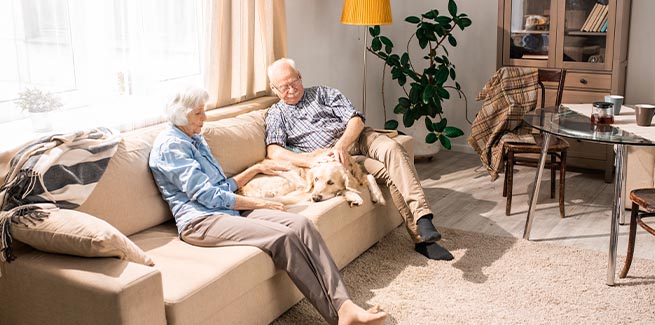Research conducted by the Australian Housing and Urban Research Institute (AHURI) has found that, despite government incentives to downsize, a majority of older Australians are choosing not to move out of the family home.
In the cases in which older Australians do eventually leave, it is often sparked by external circumstances, such as the death of a partner, or declining health conditions, rather than economic advantage of downsizing.
The study spanned a 15-year period between 2001 and 2016, and examined the housing decisions of Australians over the age of 55.
Of home owners who were aged between 65 and 74 in 2001, around 65 per cent were still living in the same home 15 years later, in 2016.
For those aged 75 and over in 2001, more than half still remained in their original residence in 2016.
According to AHURI, around 10 per cent of those aged under 75 in 2001 downsized from an owner-occupied residence into a rental property, and around 20 per cent of those aged above 75 did so.
Less than 20 per cent of home owners had downsized in the 15-year study period to a less expensive owner-occupied dwelling.
Largely, health-related reasons were cited as the main factor causing those over the age of 80 to move, and generally these Australians moved into a retirement or care home.
The situation for older Australians renting in the private sector was quite different, the AHURI found.
Renting often involved much higher rates of people moving residence, with less than half of older Australians who were renting a home in 2001 remaining in the same residence 15 years later.
Only around a third of renters aged over 75 in 2001 were in the same dwelling in 2016.
The research also found that in 2016, owner-occupiers aged 55-64 were far less likely to own their home outright.
According to the study, 75.0 per cent of owner-occupier couples aged 80 years and over owned their home outright in 2016, compared with 42.4 per cent of those aged 55-59, and 58.5 per cent of those aged 60-64.
The AHURI raised concerns about the “implications” of this trend, stating that retiring with an outstanding mortgage had the potential to put a strain on superannuation and aged pension payments, which could otherwise be used on non-housing related costs, such as healthcare.
Older individuals cited the costs associated with moving, such as stamp duty or removalists, in addition to their inability to physically be involved in moving (caused by health issues, or age-related fragility or disability), to be the two biggest barriers against moving out of the family home.
Lead researcher associate professor Stephen Whelan summarised the findings: “Our research shows that older, home-owning Australians are generally reluctant to downsize or to spend their housing wealth over the course of their retirement.
“When such transitions do occur, they tend to be associated with key life events that are not induced by or associated with policy settings; for example, health shocks that require a move into aged care, retiring from the workforce or the death of a partner.”
Government policy: past and future
Since 2017, the federal government has been incentivising older Australians to downsize by allowing those who have sold their homes make a “downsizer contribution” to their superannuation, in an attempt to reduce pressure on housing affordability and free up larger homes for younger, growing families.
However, the AHURI suggests that policymakers instead focus on the replacement of stamp duty with a broad-based land tax, the implicit tax benefits to owner-occupiers, and the concessional treatment of owner-occupied housing in the age pension eligibility rules.
The report states: “While there is a broad consensus about the types of change to policy that are required, making changes is challenging.
“Nonetheless, recent changes to the age pension assets test suggest that reforms can be made to limit the generous treatment of owner-occupied housing and reduce the incentive to accumulate and retain high levels of housing wealth.
“Such changes must acknowledge that existing wealth portfolios of older Australians have been shaped by a set of rules and policy settings that they have experienced over their working lives.”
[Related: Women more likely to own a home than men]

